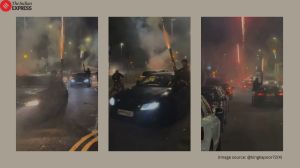Pak Taliban declare ceasefire, thank Govt ‘leniency’
A coalition of Taliban militants in northwestern Pakistan declared an...

A coalition of Taliban militants in northwestern Pakistan declared an “indefinite” ceasefire on Wednesday in fighting against security forces. The Government said it was preparing for peace talks.
Meanwhile, a Pakistani Army helicopter crashed in the same region, killing three generals and five other soldiers. The Army said initial reports indicated a technical fault in the chopper and ruled out hostile fire as the cause.
Maulvi Mohammed Umar, a spokesman for the Tehrik-e-Taliban Pakistan, a militant umbrella group, said the ceasefire would cover the lawless, semiautonomous tribal belt that borders Afghanistan, and the restive region of Swat where the Army also has battled pro-Taliban fighters.
Any agreement by Pakistan to a ceasefire would likely be frowned on by its Western allies.
A truce in North Waziristan in September 2006, which collapsed the following July, was widely seen as giving Taliban and al-Qaeda a freer hand to stage cross-border attacks into Afghanistan and expand their reach inside Pakistan.
Tehrik-e-Taliban is led by Baitullah Mehsud, an al-Qaeda-linked militant commander based in South Waziristan and blamed by the Government for a series of suicide attacks across Pakistan — including the assassination of Benazir Bhutto.
“The Government has shown leniency over the past four or five days,” Maulvi Umar said over the telephone. “That’s why we are declaring a ceasefire.”
“The declaration of war we made against security forces on orders by Baitullah Mehsud. We now withdraw that for an indefinite period,” Umar told The Associated Press by telephone. He said the ceasefire was the result of talks with the Government.
Pakistan Army spokesman Maj Gen Athar Abbas denied knowledge of any talks but said militants in South Waziristan had stopped firing on security forces for two days and had retreated a little after recent intense clashes. He said the military operation against the militants was continuing for now.
Interior Minister Hamid Nawaz, who claimed security forces had “broken the back” of Mehsud’s fighters, said the Government would form a jirga, or tribal council, very soon “for dialogue with the militants”. He said the jirga would comprise “influential people and peaceful citizens”.
The recent wave of violence has pitched Pakistan deeper into turmoil as it heads toward February 18 elections meant to usher back democracy after eight years of military rule under President Pervez Musharraf.
In January, Mehsud fighters launched a series of assaults on military bases in South Waziristan, underscoring the Government’s weak grip on the region that US officials say is a safe haven for al-Qaeda.
Last week, a US missile strike killed Abu Laith al-Libi, a top al-Qaeda commander, in North Waziristan.
Washington considers Pakistan a key ally in the war on terrorism, and Musharraf’s Government said on Wednesday it remained committed to that fight.
Pakistan already has made “more sacrifices than any other country” in the struggle against Islamic terrorism, Foreign Ministry spokesman Mohammed Sadiq told reporters.
The Army said the military helicopter went down near the scene of intense recent fighting.
The pilot had reported an unspecified technical problem before the crash, which occurred near the road that links Wana, South Waziristan’s main town, with Jandola, another town in the area. Weather in the area was not bad at the time, Abbas said.
He ruled out hostile fire because militants had not been firing on security forces for the last 48 hours.





- 01
- 02
- 03
- 04
- 05


























